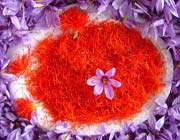The Golden Spice Saffron has Golden Health Benefits Too

One of the most costly spices in the world derived from the dried stigma of saffron flower is the saffron spice.
This spice is considered as a golden spice as it can not only be used in cooking to add an aroma to food, turning any dish into an exotic one, it can also be beneficial to a number of health problems. It is used as medicine from ancient times. This spice is special and a precious spice as it has numerous health benefits which can help in the enhancement of one’s overall well being.
Nutritional Value of Saffron
Amount of Saffron: 1 cup
Total Weight of Saffron: 100 g
| Nutrients | Amount |
| Basic Components | |
| Protein | 11.4 g |
| Water | 11.9 g |
| Ash | 5.5 g |
| Calories | |
| Total Calories | 310 |
| Calories From Carbohydrate | 233 |
| Calories From Fat | 49 |
| Calories From Protein | 27.9 |
| Carbohydrates | |
| Total Carbohydrate | 65.4 g |
| Dietary Fiber | 3.9 g |
| Fats & Fatty Acids | |
| Total Fat | 5.8 g |
| Saturated Fat | 1.6 g |
| Monounsaturated Fat | 0.4 g |
| Polyunsaturated Fat | 2.1 g |
| Total Omega-3 Fatty Acids | 1248 mg |
| Total Omega-6 Fatty Acids | 754 mg |
| Vitamins | |
| Vitamin A | 530 IU |
| Vitamin C | 80.8 mg |
| Thiamin | 0.1 mg |
| Riboflavin | 0.3 mg |
| Niacin | 1.5 mg |
| Vitamin B6 | 1.0 mg |
| Folate | 93.0 mcg |
| Minerals | |
| Calcium | 111 mg |
| Iron | 11.1 mg |
| Magnesium | 264 mg |
| Phosphorus | 252 mg |
| Potassium | 1724 mg |
| Sodium | 148 mg |
| Zinc | 1.1 mg |
| Copper | 0.3 mg |
| Manganese | 28.4 mg |
| Selenium | 5.6 mcg |
Nutrition Benefits of Eating Saffron
Disease prevention
One of the main saffron benefits when used in cooking food is that it contains many plant derived chemical components which are known to prevent diseases. They are also known to promote overall well-being of the body.
Volatile oils
The plant part from which saffron is obtained contains essential but volatile oils which when added to food, imparts its unique flavour and benefits of saffron as a spice. Some of these oils are cineole, pinene, borneol, geraniol etc.
Active components
Apart from the volatile oils, there are also non-volatile active components like carotenoid compound that are anti-oxidants beneficial to the body. These prevent free radical reactions which produce harmful by-compounds and diseases. Some of the carotenoids like zea-xanthin, lycopene, alpha and beta carotene are widely appreciated. This is also one of the main uses of saffron.
Anti depressant
The active components in the saffron make our body lose its depressing characteristics making it a dietary necessity sometimes.
Cell formation and repair
Potassium, found in saffron, is a necessary source that favours cell formation and repair.
Heart diseases, blood pressure
Potassium also helps maintains the blood pressure and keeps heart diseases at bay.
Insomnia
It is said that saffron is also a mild sedative which can be used for insomnia. Taking a pinch of saffron with milk before bed helps in sleep disorders like insomnia.
Fever
Saffron also contains the compound “crocin”, which scientists believe that helps in reducing fever. Crocin found in saffron also promotes learning, memory retention, and recall capacity.
Blood cell production
Iron is a very useful component in the body as the blood requires it to form haemoglobin and it is a co-factor in the red blood cell production too.
Optimum health
The overall mineral content including calcium, vitamins, proteins etc present in Saffron ensure the maintenance of optimum health.
· Saffron is very much effective in lowering the blood cholesterol level and triglycerides among the heart patients. Saffron was even used in ancient times to increase blood circulation and relieve stomach aches and kidney stones.
· The presence of carotenoids in saffron also helps to curb skin tumors and improve arthritis.
· Saffron, when rubbed or massaged on the gums, helps in reducing soreness and inflammation of the mouth and tongue.
· Saffron also contains several antioxidants such as zeaxanthin and lycopene that help in protecting the body from oxidant induced stress, infections and acts of immune modulators.
· Herbalists believe that saffron is capable of treating cancer, as it contains anti-cancer properties. However, the effectiveness of saffron in treating cancer is still under research.
Saffron Side Effects
The intake of saffron needs to be monitored. In case this spice or saffron supplements are consumed in excessive amounts, there is the fear of some minor side effects; which include:
· Vomiting
· Drowsiness
· Food cravings or appetite reduction
· Nausea
There are also a few serious side effects of saffron; so, if you notice any of the following symptoms, you need to seek immediate medical attention.
· Bloody stools
· Blood in urine
· Nosebleeds
· Persistent vomiting
· Feeling of vertigo
· Jaundice
The side effects of saffron could be dangerous when its intake is not properly monitored. Saffron could also cause allergic reactions in certain individuals and therefore one need to be careful of such situations. Doctors also advise breast feeding mothers to avoid medium to large doses of saffron, as the effects on a newborn baby are unknown.
Sources:
thecambodiaherald.com
stylecraze.com
lifestyle.iloveindia.com
diethealthclub.com
Other Links:
Ginger, Natural Cure to Numerous Disorders